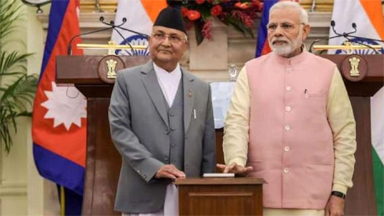
KATHMANDU (TIP): The Communist Party of Nepal-Unified Marxist Leninist (CPN-UML) on July 11 said the landlocked Himalayan nation can attain economic prosperity only by maintaining close friendly relations with India, asserting that it will not allow any activity directed against the southern neighbour from the Nepalese soil.
The remarks by a senior leader of the party led by former prime minister KP Sharma Oli came on the eve of a confidence vote in Parliament, which may see him return as the politically fragile Himalayan nation’s premier once again. “CPN-UML doesn’t believe that Nepal can progress or the interest of Nepalese people could be promoted by pursuing anti-India policy,” Dr Rajan Bhattarai, the Foreign Affairs Department chief and Standing Committee member of the CPN-UML, told PTI in an interview.
He said the party’s chairman Oli wants to take Nepal-India relations to a new height as per the demand of the 21st century.
“We believe that we can attract more foreign investment, promote trade, and attain economic prosperity only by maintaining close friendly relations with India,” he said.
“We consider India as an important neighbour, and we won’t allow any activity directed against India from our soil.”
Oli is known for his pro-China stance, and it would be interesting to see how he maintains ties of equi-proximity with both neighbours if he becomes prime minister after toppling Prime Minister Pushpa Kamal Dahal “Prachanda” after Friday’s floor test in the House of Representatives.
“Our party has a clear view in not allowing any activity directed against another neighbour by taking the side of one neighbour,” Bhattarai told PTI.
Although there are some problems in bilateral relations due to some provisions of the 1950 treaty, border dispute, inundation of land in the border areas and the growing trade deficit, the CPN-UML wants to resolve them through dialogue, he said.
“We can resolve all our problems by sitting together and holding talks in a friendly manner,” he added.
Ties between the two countries came under severe strain in 2020 after Kathmandu published a new political map that showed the three Indian territories—Limpiyadhura, Kalapani and Lipulekh—as part of Nepal.
Then Prime Minister Oli attempted to use the issue to fend off increasing domestic pressure and challenge his leadership.
In the past, Oli had publicly criticised India for allegedly interfering in Nepal’s internal affairs.
Land-locked Nepal relies heavily on India for the transportation of goods and services.
Nepal is also important for India in the context of its overall strategic interests in the region, and the leaders of the two countries have often noted the age-old ‘Roti Beti’ relationship.
Nepal shares a border of over 1,850 km with five Indian states: Sikkim, West Bengal, Bihar, Uttar Pradesh, and Uttarakhand.
“It is our firm belief that a stable, prosperous, peaceful, and developed Nepal will also be in the interest of India,” Bhattarai said.
“However, we would also like to make it clear that our relations will be based on non-intervention in internal affairs and promoting national interest.”(PTI)




Be the first to comment